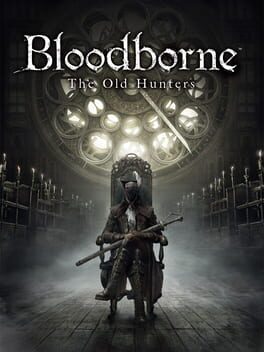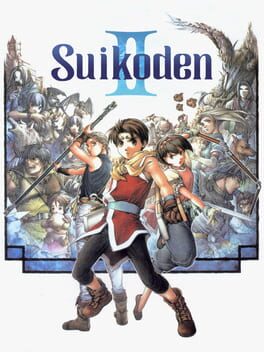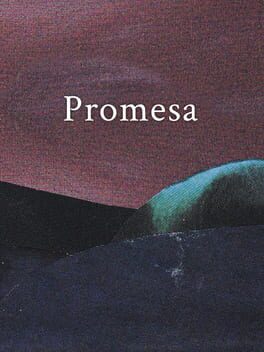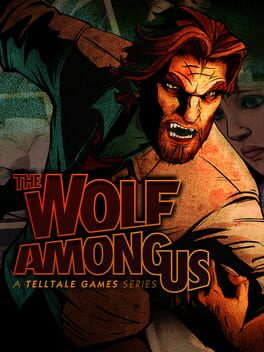sam_gray
Has a weird structure, beginning on a brutally hard note (the Ludwig fight), going narratively explicit in the middle, and finishing somewhere primal and hard again. Orphan of Kos is a great fight, and some of the environmental design is good, but I still have the same problem with Bloodborne: it's at once too vague to be satisfying and not abstract enough to work as a mood piece. Comparisons to the original Dark Souls are unfavourable - that was all about light and shadow and could be enjoyed as a kind of perverse origin myth, whereas this is more a series of disjointed setpieces with tenuous thematic connections. It's trying to evoke dream logic, which is at odds with the grounded, you-are-there nature of the gameplay. Which is maybe the point, but it doesn't always work for me. And fuck Laurence.
1998
This review contains spoilers
The flaws are obvious: 108 characters is just too many for one game to handle without feeling overstuffed, though I appreciate the efforts to make them all distinct, even if some end up as one-dimensional comic relief. I wasn't convinced by the best friend's betrayal, with the subsequent parallel narrative only glimpsed in occasional, underwritten cutscenes. The endings are curiously unsatisfying, too - perhaps all a result of a clumsy translation. And yet the game's appeal still shines through. It's uncommonly direct about politics and the devastation of war, and constantly ties it into the gameplay - hearing e.g. a village you regularly visit for items has been destroyed lends the story an extra degree of weight. The evolving home castle is a marvellous location, too. It's full of asides that deepen our relationship to the characters and the ideology of the main mission, culminating in the moving moment where "reinforcements" in a major battle are simply the vendors and NPCs coming to your aid. Not exactly a challenging game, and not quite as emotionally magnificent as something like Final Fantasy VI, but it shares with that one a precision in its 16-bit cutscene direction, revealing all manner of human detail with the smallest changes to its sprites.
2020
This review contains spoilers
So the greatest video game franchise of all time ends on a bit of a whimper. It’s still 90% of the way there, ditching much of the series’ lunatic theatrics for an addictive gameplay loop where war is a fun business. I like how this, like its predecessors, tries to reinvent the wheel, and while it’s similar to the (brilliant) Peace Walker - proceeding like a television show, with regular small-scale crises and a larger threat only occasionally making itself known - the overall trajectory is very different. The unfinished aspects almost help the game’s structure, as the unsatisfying Skull Face defeat gives way to diminishing returns, paranoia, and boredom, at which point the main character’s slide into villainy seems inevitable. It sometimes gets a bit Spec Ops: The Line with its unsubtle messaging - but I don’t hate that game (war games are inherently pro-military, it’s fair to criticise that) and moments like your base soldiers humming the Peace Walker theme before you shoot them are suitably chill-inducing.
That being said, the ending is terrible. It isn’t woven into the dramatic structure, it just happens - you suddenly replay the tedious hospital sequence with a new cutscene at the end. It’s a shame, because there’s something fascinating there about puppetry and identity and power - all key to the Metal Gear experience. There’s something powerful, too, about Quiet, the silent assassin who falls in love with the doppelgänger of the man she’s supposed to kill, whose silence is revealed as irrefutable proof of that. But the character design (and camera angles) are Kojima at his most openly misogynistic. (Thankfully there’s nothing quite as bad this time as Paz’s vagina bomb.) So 90% of the way there - which, as it turns out, is a pretty good game.
That being said, the ending is terrible. It isn’t woven into the dramatic structure, it just happens - you suddenly replay the tedious hospital sequence with a new cutscene at the end. It’s a shame, because there’s something fascinating there about puppetry and identity and power - all key to the Metal Gear experience. There’s something powerful, too, about Quiet, the silent assassin who falls in love with the doppelgänger of the man she’s supposed to kill, whose silence is revealed as irrefutable proof of that. But the character design (and camera angles) are Kojima at his most openly misogynistic. (Thankfully there’s nothing quite as bad this time as Paz’s vagina bomb.) So 90% of the way there - which, as it turns out, is a pretty good game.
I love the structure, the slow, difficult progression of the first half spent inadvertently memorising an environment that gets (literally) flipped in the second half. You don't get a map when you get to the inverted castle - you just have to work it out from memory and familiar cues.
I also love the weirdness of each individual enemy, and the sheer volume of them. It's an excessive game, the last gasp of 2D before 3D became king, which means it's actually dated rather well. It's boring to say that all roads lead to Dark Souls, but this is its most obvious stylistic influence - hands off, surprisingly stat-driven, and eventually able to be broken in an appealing way.
I also love the weirdness of each individual enemy, and the sheer volume of them. It's an excessive game, the last gasp of 2D before 3D became king, which means it's actually dated rather well. It's boring to say that all roads lead to Dark Souls, but this is its most obvious stylistic influence - hands off, surprisingly stat-driven, and eventually able to be broken in an appealing way.
2013
Silly, but I have a soft spot for the Telltale formula. The detective story pairs well with the gameplay, which gives you a nagging sense of always missing out on something due to the choices you make. It's also a challenge to the player's God complex: playing as a cop (literally a lone wolf) who must adapt to his community, where there isn't yet an institution he can hide behind. Obviously hampered by some blatant telegraphing, stilted dialogue, and a terrible villain (Bloody Mary) - but intriguing enough to be sad that its original creative team never got to continue the story.





